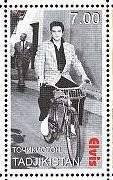
Artist: Yann Tiersen
Song: La Dispute
Album: Le Fabuleux Destin d’Amélie Poulain (2001)
With his whimsical, melancholy music, Yann Tiersen has become a sought-after composer, not only for his soundtrack work, but in his own right. Borrowing from French folk music, chanson, musette waltz and street music, as well as rock, avant-garde, and classical and minimalist influences, Tiersen's deceptively simple style has been likened to Chopin, Erik Satie, Philip Glass, and Michael Nyman. The Paris-based composer became popular outside his native country for his score to Jean-Pierre Jeunet's Amélie, but like most seemingly overnight successes, he had been working for years before the film's success brought him international acclaim. Born in Brest in Brittany, on June 23, 1970, Tiersen was raised in Rennes and made a name for himself as one of the star pupils at his local conservatory (despite middling academic grades). Tiersen studied violin and piano from the ages of six to 14, and eventually trained to be a conductor. However, Tiersen rebelled against his classical training and, inspired by the likes of Joy Division and the Stooges, played guitar with several local post-punk-influenced bands during his later teenage years. At the same time, Tiersen was also composing soundtracks for short films and accompaniment for plays. Several of these pieces ended up on his first album, Valse des Monstres, in 1995 and introduced his delicate but deeply emotional style, and which also featured intricate arrangements incorporating instruments as varied as toy piano, banjo, harpsichord, melodica, and carillon, as well as piano and guitar. …. ~ Heather Phares, All Music Guide
Scores scene in which older man recalls biking contests in youth.
Incorporates sound of a spinning bike wheel and layered lyrics.
movie
music
[excerpt translated from French] I go to work every day on my old
bicycle you loved... it's the same circle that leads to nowhere and I'm tired...
Song: La Dispute
Album: Le Fabuleux Destin d’Amélie Poulain (2001)
With his whimsical, melancholy music, Yann Tiersen has become a sought-after composer, not only for his soundtrack work, but in his own right. Borrowing from French folk music, chanson, musette waltz and street music, as well as rock, avant-garde, and classical and minimalist influences, Tiersen's deceptively simple style has been likened to Chopin, Erik Satie, Philip Glass, and Michael Nyman. The Paris-based composer became popular outside his native country for his score to Jean-Pierre Jeunet's Amélie, but like most seemingly overnight successes, he had been working for years before the film's success brought him international acclaim. Born in Brest in Brittany, on June 23, 1970, Tiersen was raised in Rennes and made a name for himself as one of the star pupils at his local conservatory (despite middling academic grades). Tiersen studied violin and piano from the ages of six to 14, and eventually trained to be a conductor. However, Tiersen rebelled against his classical training and, inspired by the likes of Joy Division and the Stooges, played guitar with several local post-punk-influenced bands during his later teenage years. At the same time, Tiersen was also composing soundtracks for short films and accompaniment for plays. Several of these pieces ended up on his first album, Valse des Monstres, in 1995 and introduced his delicate but deeply emotional style, and which also featured intricate arrangements incorporating instruments as varied as toy piano, banjo, harpsichord, melodica, and carillon, as well as piano and guitar. …. ~ Heather Phares, All Music Guide
Scores scene in which older man recalls biking contests in youth.
Incorporates sound of a spinning bike wheel and layered lyrics.
movie
music
[excerpt translated from French] I go to work every day on my old
bicycle you loved... it's the same circle that leads to nowhere and I'm tired...






